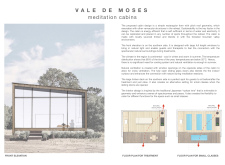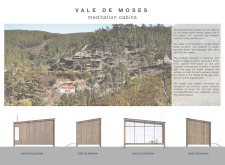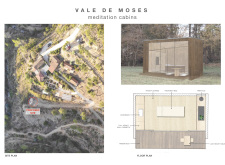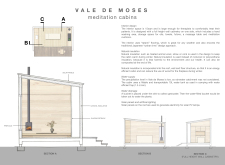5 key facts about this project
The VALE DE MOSES meditation cabins sit in a peaceful forested mountain valley, designed to create quiet spaces for meditation and contemplation. The overall design focuses on sustainability and a close relationship with nature. The cabins have a simple rectangular shape and a pitched roof, reflecting the style of local buildings while minimizing their impact on the environment.
Design Concept
The cabins are designed to be energy-efficient and self-sufficient. Large full-height windows on the southern side allow plenty of natural light into the interior spaces and provide views of the surrounding woods. This orientation benefits from the area's continental climate, where winters are cool and summers are warm. Natural ventilation is a key feature, reducing the need for artificial cooling and creating a comfortable atmosphere inside.
Materials and Insulation
Sustainability is further reflected in the materials used for insulation. Treated animal wool, straw, and cork are chosen for their thermal properties, keeping the cabins warm during colder months. These materials are more environmentally friendly than traditional options. By utilizing these natural insulators, the design can maintain a comfortable indoor climate without excessive energy use.
Water and Energy Management
The cabins utilize an innovative approach to water management. A fillable and transportable water tank accommodates the low rainfall in the area, simplifying the need for complex plumbing. Greywater is collected and used for watering plants, which aligns with the goal of conserving resources. Solar panels on the roofs generate electricity, making the cabins less dependent on external energy sources.
Indoor and Outdoor Flow
The interior spaces are adaptable, inspired by traditional Japanese ryokan inns that focus on simplicity and tranquility. Full-height cabinetry organizes therapeutic items while keeping the areas tidy and calm. A large timber deck provides a transition from inside to outside, allowing residents to enjoy nature and participate in small group activities. Natural wood finishes throughout add warmth to the cabins, creating inviting and comfortable environments for relaxation and meditation.






















































